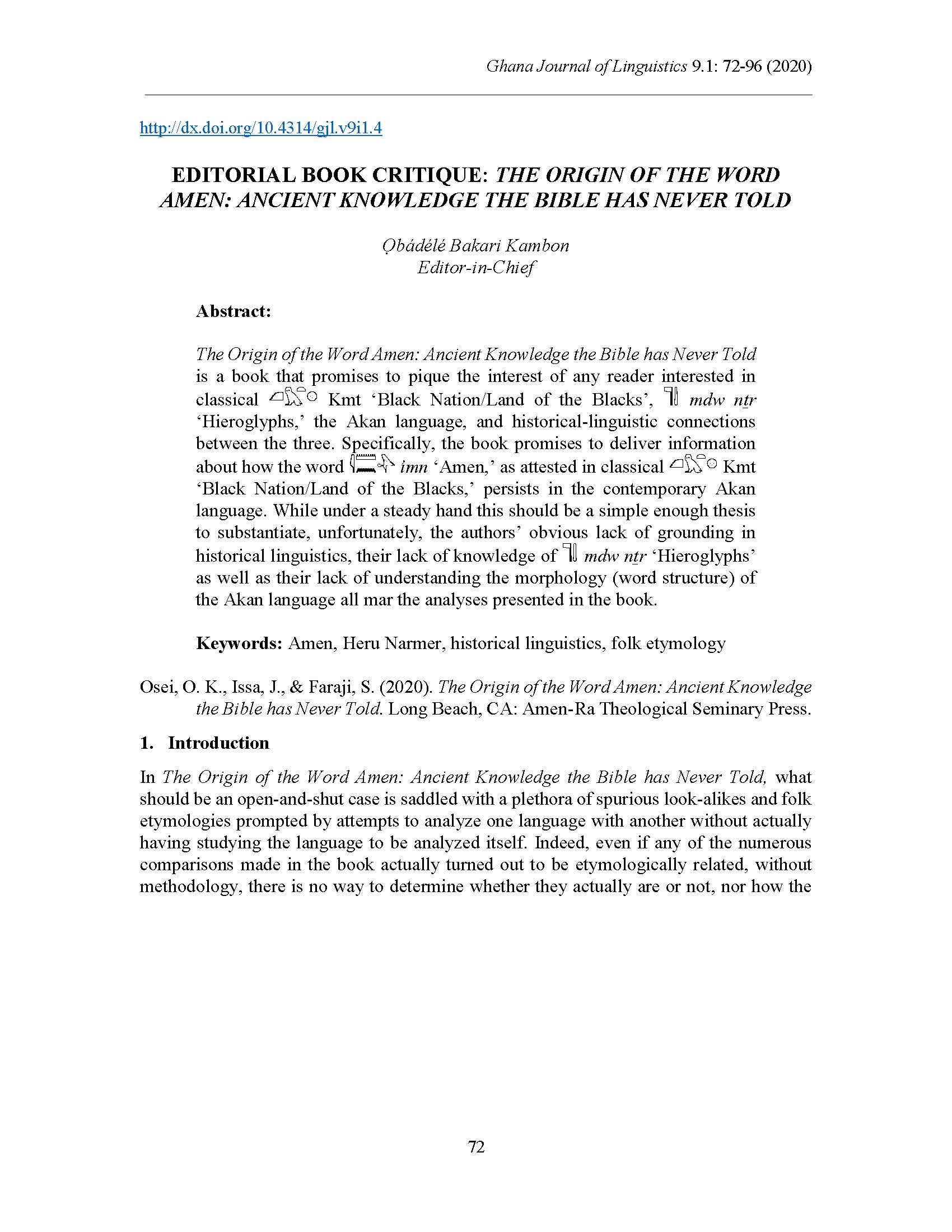Editorial Book Critique: The Origin of the Word Amen: Ancient Knowledge the Bible has Never Told
DOI:
https://doi.org/10.4314/gjl.v9i1.368Keywords:
Amen, Heru Narmer, historical linguistics, folk etymologyAbstract
The Origin of the Word Amen: Ancient Knowledge the Bible has Never Told is a book that promises to excite the interest of any reader interested in classical Kmt ‘Black Nation/Land of the Blacks’, mdw nTr ‘Hieroglyphs,’ the Akan language, and historical/linguistic connections between the three. Specifically, the book promises to deliver information about how the word imn ‘Amen,’ as attested in classical Kmt ‘Black Nation/Land of the Blacks,’ persists in the contemporary Akan language. While, under a steady hand this should be a simple enough thesis to substantiate, unfortunately, the authors’ obvious lack of grounding in historical linguistics, their lack of knowledge of mdw nTr ‘Hieroglyphs’ as well as their lack of understanding the morphology (word structure) of the Akan language all mar the analyses presented in the book.
References
References
Allen, James P. 2014. Middle Egyptian: An Introduction to the Language and Culture of Hieroglyphs. Cambridge: Cambridge University Press.
Budge, Ernest Alfred Wallis. 1913. The Papyrus of Ani: A Reproduction in Facsimile, Vol. 2: Putnam.
College, Medgar Evers. 2020, "Jahi Issa", Web: ares.mec.cuny.edu. Retrieved 27 June 2020, 2020 (https://ares.mec.cuny.edu/academic-affairs/jahi-issa/).
Dreyer, Günter. 1987. "Ein Siegel Der Frühzeitlichen Koningsnekropole Von Abydos." Mitteilungen des Deutschen Archäologischen Instituts. Abteilung Kairo 43:33-43.
Faraji, Salim. 2020. "Re: Amen Book." Web: gmail.com.
Gardiner, Alan. 1959. Royal Canon of Turin. Oxford: Griffith Institute.
Gardiner, Sir Alan Henderson. 1957. Egyptian Grammar: Being an Introduction to the Study of Hieroglyphs. Oxford: Oxford University Press on behalf of Griffith Institute, Ashmolean Museum.
GreekPod101.com. 2020. Learn Greek - Level 4: Intermediate: Volume 1: Lessons 1-25. Tokyo: Innovative Language Learning.
Herodotus and Alfred Denis Godley. 1986. Herodotus, Books I-Ii. Cambridge, MA: Harvard University Press.
Herodotus. 2018, "Ηροδοτου Ιστοριαι Βιβλίον Β´· Herodotus Published in Vol. I of the Loeb Classical Library Edition, 1922", Web: University of Chicago. Retrieved 12 June 2020, (https://penelope.uchicago.edu/Thayer/E/Roman/Texts/Herodotus/2B*.html).
Investigator, Quote. 2014, "If Your Only Tool Is a Hammer Then Every Problem Looks Like a Nail", Web: quoteinvestigator.com. Retrieved 25 June 2020, 2020 (https://quoteinvestigator.com/2014/05/08/hammer-nail/).
Issa, Jahi and Salim Faraji. 2009. "The Obama Administration: Revisiting and Reconsidering Africom."
Issa, Jahi U. 2005. The Universal Negro Improvement Association in Louisiana: Creating a Provisional Government in Exile: Howard University.
Kambon, Ọ and De-Valera N.Y.M. Botchway. Forthcoming. "The Classical Kmtyw Origins of Pan-Afrikanism and the DikèNga Theory of Kmtyw Consciousness." Ankh Revue.
Kambon, Obadele, Reginald Duah and Clement Appah. 2018. "Serial Verb Nominalization in Akan: The Question of Intervening Elements." Pp. 361–86 in Theory and Description in African Linguistics: Selected Papers from Acal 47 edited by E. Clem, P. Jenks and H. Sande. Berlin: Language Sciences Press.
Lundström, Peter. 2020a, "Smenkhkara", Web: Pharaoh.se. Retrieved 27 June 2020, 2020 (https://pharaoh.se/pharaoh/Smenkhkara).
Lundström, Peter. 2020b, "Menkara", Web: Pharaoh.se. Retrieved 25 June 2020, 2020 (https://pharaoh.se/pharaoh/Menkara).
Lundström, Peter. 2020c, "Thutmose Iii", Web: Pharaoh.se. Retrieved 25 June 2020, 2020 (https://pharaoh.se/pharaoh/Thutmose-III).
Lundström, Peter. 2020d, "Mentuhotep Ii", Web: Pharaoh.se. Retrieved 25 June 2020, 2020 (https://pharaoh.se/pharaoh/Mentuhotep-II).
Lundström, Peter. 2020e, "Seti I", Web: Pharaoh.se. Retrieved 27 June 2020, 2020 (https://pharaoh.se/pharaoh/Seti-I).
Lundström, Peter. 2020f, "Abydos King List", Web: Pharaoh.se. Retrieved 16 June 2020, 2020 (https://pharaoh.se/abydos-king-list).
Lundström, Peter. 2020g, "Narmer", Web: Pharaoh.se. Retrieved 25 June 2020, 2020 (https://pharaoh.se/pharaoh/Narmer).
Lundström, Peter. 2020h, "Archaic Period", Web: Pharaoh.se. Retrieved 29 June 2020, 2020 (https://pharaoh.se/archaic-period).
Lundström, Peter. 2020i, "Semenenra", Web: Pharaoh.se. Retrieved 25 June 2020, 2020 (https://pharaoh.se/pharaoh/Semenenra).
Lundström, Peter. 2020j, "Menkaura", Web: Pharaoh.se. Retrieved 25 June 2020, 2020 (https://pharaoh.se/pharaoh/Menkaura).
Lundström, Peter. 2020k, "Mentuemsaf", Web: Pharaoh.se. Retrieved 25 June 2020, 2020 (https://pharaoh.se/pharaoh/Mentuemsaf).
Lundström, Peter. 2020l, "Menkauhor", Web: Pharaoh.se. Retrieved 25 June 2020, 2020 (https://pharaoh.se/pharaoh/Menkauhor-Kaiu).
Merriam-Webster. 2018, "Simile", Web: merriam-webster.com. Retrieved 21 June 2020, 2020 (https://www.merriam-webster.com/dictionary/simile).
Morgan, Stephen Nkansah. 2020. "The Place of African Animal Ethics within the Welfarist and Rightist Debate: An Interrogation of Akan Ontological and Ethical Beliefs Towards Animals and the Environment."
Obenga, Theophile. 1993. Origine Commune De L'egyptien Ancien, Du Copte Et Des Langues Negro-Africaines Modernes. Paris: L'Harmattan.
Osei, O. Kwame, Jahi Issa and Salim Faraji. 2020. The Origin of the Word Amen: Ancient Knowledge the Bible Has Never Told. Long Beach, CA: Amen-Ra Theological Seminary Press.
Petrie, William Matthew Flinders. 1888. A Season in Egypt, 1887, Vol. 35: Field & Tuer.
Petrie, William Matthew Flinders. 1901. The Royal Tombs of the First Dynasty, Vol. II. Cambridge: Cambridge University Press.
Peust, Carsten. 1999. Egyptian Phonology: An Introduction to the Phonology of a Dead Language, Vol. 2. Göttingen: Peust und Gutschmidt.
von Beckerath, J. 1999. Handbuch Der Ägyptischen Königsnamen. Berlin: Dt. Kunstverl.
Vygus, Mark. 2015. "Middle Egyptian Dictionary." Web: Pyramid Texts Online. Retrieved.

Downloads
Published
How to Cite
Issue
Section
License
Copyright (c) 2020 Ghana Journal of Linguistics

This work is licensed under a Creative Commons Attribution 4.0 International License.
The Ghana Journal of Linguistics is published by the Linguistics Association of Ghana, P. O. Box LG 61, Legon, Accra, Ghana.
LAG Email: linguisticsgh@gmail.com. Website: http://www.laghana.org
GJL Email: gjl@laghana.org Website: http://www.laghana.org/gjl
© Linguistics Association of Ghana and individual authors, 2023.
